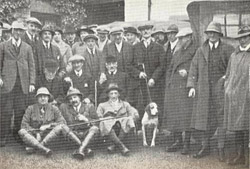
Mardale Shepherds' Meet & Hunt, 1921
Joe Bowman, centre.
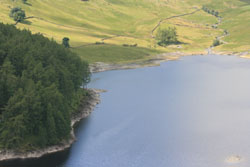
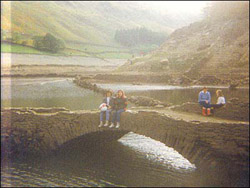
Mardale Summer 1989
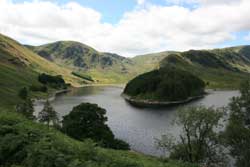
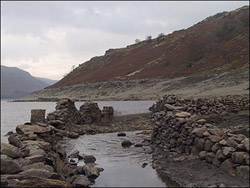
Mardale Droveway
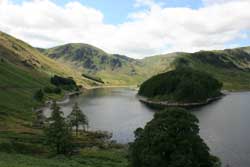
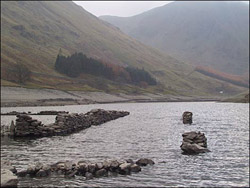
Mardale Old Road
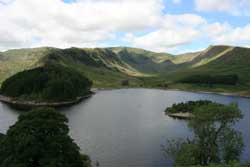
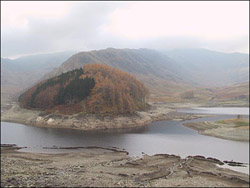
Mardale Fields
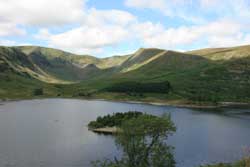
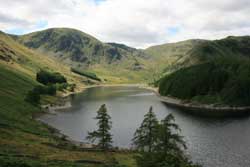
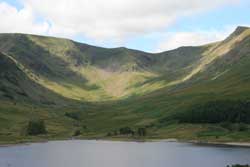
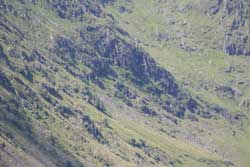
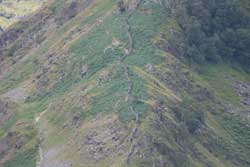
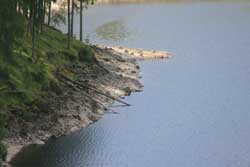
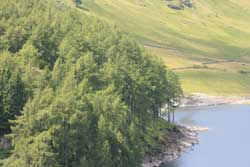
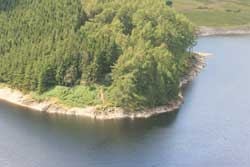
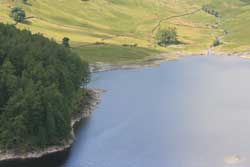
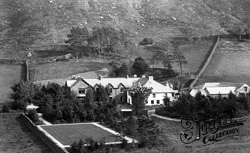
The Dun Bull, 1893
circa 1906
Probably one of the most famous "Meets" in the hunting calendar was at Mardale and known as The Shepherds' Meet; linked forever with Joe Bowman the meet itself was "older than the memory of man". Many tales of the hunting and "goings on" have filtered down over the years, but precious few by anyone who appears to have actually been there, most tales retold without reference to who actually started them. In 1906 Cannon Rawnsley who went on to become one of the founders on the National Trust wrote a book called Months at the Lakes. Rawnsley did not like foxhunting much but includes in the book a chapter about The Mardale Shepherds' Meet in which Bowman makes an appearance. The tale is told by a character referred to as the "wanderer" whose identity is unknown but judging by the detail appears to have first hand knowledge. As the copyright has expired the whole chapter is reproduced, I make no apology for doing so, and an "edit" would spoil the narrative.
We are fortunate in the Lake Country in having a longer leafage of the trees than is found in the Midlands or the South. When November comes the woods have not yet waned and are full of Autumn glory, and though it may happen that a sudden frost, with a strong wind following, may rob us of this glory in a night, if we have the usually mild and calm weather that is our portion, our Lakeland woodlands are still in leaf as late as the middle of the month. To artists or lovers of colour, we would say, " Do not leave us when October ends : the weather is calm and temperature high, you may still sit and work out of doors. It is in November that the larch puts on its gold, and in November that the deep red of the beech-trees and the fire upon the feathery rowans is seen to contrast most magi-cally with the sombre russet of the oaks." These oaks are themselves a study for variety of hue, for the leaf of the oak which in our country is the Dur-mast oak with its sessile fruit, changes from day to day by the slow crisping of its leafage, and the under side of the leaf in its duller greyness forms contrast with the leaves as yet uncurled. Those ' Dryads' crowns ' which November weaves upon the oak branches, break and splinter the light, and seem to accentuate the density and full- ness of the oak tree foliage. It is now, in the early days of November, that the blue-green of the Scotch fir is seen in most wonderful beauty against the gold, and along the water courses the alders in their unchanging green, come forth to unexpected prominence. It is in November too that one notes the dainti- ness of the lady of the wood, for the birch tree, losing its leafage slowly, is seen now like a foun- tain of golden drops suspended in air. And if one wishes for green and gold upon one tree, we have but to go to the black poplar or aspen tree to fill our eyes with delight. Sometimes in the wood which else is shining with every variety of golden light, a silver-grey light is seen to swim up like vapour and form a delicate background. These are the wych-elm trees that have lost their leaf or clumps of hazels or naked ash trees; for the laggard ash is first to lose his leaf - a slight frost, and its green vesture untouched to gold is seen to cover the ground. But apart from all the beauty of our November woodlands an added charm is given to our fells. It is true that much of the colour of the bracken seems to be sinking into the ground, but with every morning a hoar-frost covers the tops, and long before a general snow-fall on the higher fells, one can see, through a veil of tenderest powdered frost-silver, the shining of the ruddy fern. For a man who loves solitude and silence, November is the time for fellside walking; he will neither hear bleat of sheep nor bark of raven, he will not be impeded by heavy snow-fall, for wherever on the tops he meets the snow, he finds it hard to his foot. Always in November as he gazes down into the quiet valleys, in strange con- trast to the look of winter round about him, he sees an apparent springtide green beneath him, hears the pleasant sound of cock-crow from farm to farm, and notices the ruddy-coated rams and their mates in the pastures below. One other contrast he notes as he descends into the vale - the music of the brooks with their lack of melody on the higher moorlands. The runlets were frozen with dumbness up above, but in the valley they have found their tongues. The silence and solitude of the upper fells seem to infect the whole Lake Country. The rush of tourist life has ceased. One may walk from Grasmere to Keswick - that main trunk road, loud all through the summer with noise of wheels and hoot of motor horns - and not pass a single vehicle. Truly, if one seeks for rest and silence, one will find them at the English Lakes in November. The rooks have ceased to clamour and pass silently at morn and eventide to their resting places in the woods. Still the sea sends us its graceful restless wanderers - the gulls, and the quiet air is at in- tervals vocal with their quaint cries. Lovers of the fresh plow-land they are seen in fearless beauty of tossing wing hovering about the hind and his horses, or dappling the valley meadows as they feed. Except for these bird life seems to have passed away from us. But on our lakes, though the boats are drawn ashore and humanity seems to have deserted their silver levels, there comes with November a wonder- ful gift of life from the wild bird world. Flotillas of the golden-eyed duck and flights of mallard and widgeon may be seen, and the quaint cry of the coot is heard among the reed-beds, while by every beck one's eyes may be delighted with the antics of the Bessy Dooker- the starry-breasted curtsey- ing water ouzel. In the woodlands too, though the voice of the jay is the only loud voice heard by day, the whisperings of the schools of tits as they go from leafless larch to larch give a sound of content and winter happiness. While, if it is open weather, the squirrels leap from bough to bough, and the "little miracle of the forest", as Ruskin called it, is an engaging companion for any lover of the woods, and the brown owls crow and hoot at dawn and eventide. The hoar frost at night and the warm sun by day combine to spread a delicate hazy veil over our hills and valleys, and though we have clear morns and eventides with steel white and apple green skies at dawn, and gorgeous amber sunsets, we have for the most part to be content in Novem- ber with unaccentuated distances and lilac shadow- less hills. Often in November, which is for the most part one of our less rainy months, the walker is tempted out by the sunshine and splendour for a walk on to the fells, and if he climbs high enough he may feel the sun all day. Let him keep to the vales, and he will be disappointed; by noontide the haze has hidden the sun, and he walks in sombre gloom. But heavy as the steady cloud wrack is overhead, 't'wedder,' as the shepherds say, will not ' brek doon', and the pedestrian in the valley may at eventide see the hill ranges to the west clear purple against a golden store of fiery cloud ; while, if he looks westward, he will see the mountain-slopes burning into rose or glowing like molten copper beneath the magic of light that comes he knows not whence. The days are short and the long twilights of April are almost unthinkable of, but our moonlight evenings in some sense redeem the loss; and when towards the end of November, the snows have covered the hills, though the stars are shining, we hardly think that the day is done. Sometimes in November the flashing of what are called in the Crosthwaite valley ' Lord Derwentwater's lights* are seen, and the aurora - rosy-red or pulsing into spears of light - is seen above Skiddaw. The shepherd tells us that it means a hard winter, and the twinkling flights of the field-fares would stop to agree. But we have no fear for the birds, for the holly is a weed in our lake country, and though it is not preserved as it used to be preserved in the days of the abbots of Furness, Calder, and Shap, and when the monks of Fountains in the Keswick Vale insisted upon eating only holly-fed mutton during wintertide, we have still an abundance of holly in our woods and a good store of coral fruit for our sisters the birds. As for the farm life, November sends the plough horse afield, and the hedger to complete the careful cutting and pruning of the field-side hedgerows, while the flail may be heard with merry clatter in the barn. But November brings great cheer to the farms, for, thanks to good St. Martin who sent his friend St. Ninian to preach the gospel to the Northerners, and to be, for all we know to the contrary, the first gospeller to the fellside shepherds of old time, we here in the Lake Country have held the name of the saint in high esteem, and every farm lad and lass not only looks upon St. Martin as giving them a right to change his 'spot', as he calls his place of work, and go from farm to farm, but also as bidding them claim of their masters a very needful holiday. The statute hirings have lost something of the simplicity of old time. The men no longer stand about with straws in their mouths as a sign that they wish to be hired, but they still assemble on hiring day at the market towns, and chaffer with their would-be masters for a change of place. Very amusing it is to hear the talk that then goes for- ward. "Ye'll likely be wanting a spot? Well, thoo mun get a character and I'll think on't." "Nay, nay," the man will reply, "thoo needn't bodder nin, I'se gitten thy character, and I think ye'll likely not be for suiting me, so I'll saay good- daay". The hinds are an independent race, the master often feels that it is the man who by consenting to be hired was doing him the favour. At the end of the bargain a king's shilling passes, and the agree-ment, without writing, holds good. Things have altered a good deal in matter of hiring ways in the last thirty years. In the old days men and women stood out in the open - rain or no rain - at regular stands, marked with large tickets as are seen at cattle shows, - men, women, boys, girls; and farmers could be seen handling their arms, sounding their chests, much as you see them handling 'herdwicks' on sale, looking at their teeth, and asking how they manage their meat, for a master knows that a man with bad teeth and who might suffer from what is locally called tooth-wark, would often enough be laid by or out of temper when he was most needed afield with a cheerful mind. In these later days all this has passed away. It is true that the men still stand together or in groups in the open street, but the women have some rendezvous under shelter, and the farmers who want what they call a ' strong gel-body for t'farm 'must go off there to 'lait' her. One other great improvement has been intro-duced which good St. Martin and his friend and disciple Ninian would sure approve. A ladies' committee takes it in hand to arrange the 'hiring' dance, and instead as of old, the public-houses being filled with young men and maidens till far into the morning, the men and women meet in some airy drill hall where temperance refreshments are served, and where, under careful stewardship, the good old game of heel and toe, so well beloved in Cumberland and Westmoreland, may be played for reasonable hours. Part of the Martinmas holiday is always spent with the hounds. And in the dusk the running fellside hunters, staves in hand, may be seen coming home with their trophy, poor Reynard slung on a pole, and all the crack for many a winter's evening at the farm will centre round that memorable Mar-tinmas run with the Coniston or the Blencathra pack. These November evenings at the farms have not the interest in handicraft they used to have, when the girls dipped 'sieves ' or rushes for 'cannels' and the men carded wool, and the women spun the flax for good 'harden-sark', or the wool for linsey petticoats and bed gowns; but the local paper is read over and over again, and the game of whist is played, and after a last look at the calves, the farm door bangs, the swinging lantern disappears, and the men go off 'to sleep all night in Elysium'. In olden times the hunt was Martinmas Sunday. Sunday was the day the hard-worked estatesman felt most free to tackle the varmint that wrought such destruction to flock and farm-yard. If the hounds were out, the dale priest had no congrega-tion, and, tradition has it, sometimes went along to the hunt with his people. But that scandal has ceased, and Martinmas Monday is the holiday hunt. Hunting, like dancing, is in the fellside blood. The woman body at Wythburn who, find- ing her legs impeded by her heavy petticoat as she followed the hounds in full cry, took out a clasp knife and went in for an impromptu divided skirt, was but a sample of this keenness. The fox is the fellside farmer's natural enemy, and he hunts him not for sport only or chiefly, but for dear life upon his land. I confess I am naturally on the side of the fox, but I cannot help feeling the kind of intoxication that certainly possesses the men as they follow the horn upon the high fells. The glorious air, the magnificent and constantly chang-ing view, the music of the hounds as they climb, now lost in a gully, now clear upon the mountain's breast, rings up to one from below; all this 'felt in the blood and felt along the heart', when there is added to it the brotherliness and camaraderie of the whole company is very exhilarating and health-ful here where men follow the game afoot, where there is no earth-stopping, and the fox has a fair chance in the chase. I am inclined to agree with Edward Plantagenet, the second Duke of York, who, writing his book, The Master of Game, five hundred years ago, said, "Furthermore I will prove by sundry reasons in this little prologue that there is no man's life that useth gentle game and disport less displeasureable unto God than the life of a perfect and skilful Hunter, or from which more good cometh. The first reason is that hunt- ing causeth men to eschew the seven deadly sins. . . . For whoso fleeth the seven deadly sins as he believe he shall be saved. Therefore a good hunter shall be saved and in this world have joy enough and of gladness and of solace, so that he keep himself from two things." If Edward Plantagenet, who as good as died in the hunting field after a difficult and prolonged bear-hunt in 1387, could visit us to-day, he would find that the crown of joy in life, as he held it, was not withheld from the Lake Country sportsman for lack of keeping himself from these two things. "One is, that he leave not the knowledge nor the service of God, from whom all good cometh from his hunting : the second is, that he lose not the service of his master for his hunting nor his own duties which might profit him most." Master and man in the Lake Country are much too keen brothers of the chase to have any 4 difference over a question of goin' off wid t'hunt,' and there is happily no hunting now upon the Sunday. Nor is November without its charms for the working man who 'follows a last bit of fishing', at any rate in the Keswick neighbourhood. The River Greta is the latest salmon river in the north-western land. And though it cannot be said to be great sport to go forth with line and worm and take a black fish more dead than alive on its way to the spawning beds up the St. John's Beck, or in the River Bure when a flood comes down, and the salmon, after long delay in Bassenthwaite, make up to the Greta Bridge and the weir beneath Greta Hall, the fisher folk go crazy with excitement as they watch the great fish moving in the pools or leaping up the amber-coloured torrent stair. November, with all its silence, its sombre sounds, and its lack of gaiety, has cheer for the sportsman at the Lakes, for if he be neither hunter nor fisher you may tell by the echo of his gun that the water-fowler is busy, and the teal and widgeon and wild duck and golden eye must needs be on the alert if they are to see December days. November, it is true, has more of colour in the woods and on the fells than in the workaday life of the shepherd or the hind, but it is a cheery month for the children. Band of Hope meetings, parish room concerts, magic lantern entertainments and tea-drinkings to keep the hand of the village hostesses in for some great crowning effort at Christmas and in the New Year, prevent life being dull ; and literary society lectures, ambulance classes, choral society practices, nursing aid courses, cookery classes, dress-making meetings, seem to give the lake-land dwellers a chance of mutual improvement at the only season of the year when, because the visitors have left the country, they feel that their hands are free or their heads have leisure. THE MARDALE SHEPHERDS' MEETING. There lies to the east of the great High Street range a little water flood the Roman soldiers looked on with delight, for it called them back to their own lakeland hills, but they looked on it too with awe, for its waters seemed as black as the Stygian lake they feared. Ages before the Romans ran their high street, this lake was cared for by the shepherd children of Neolithic times. Their camps, their burial grounds, their standing stones are with us on the fellsides that slope to this lake which we call Haweswater to-day. The Vikings gave it that name, for it means the Halse Water or Neck-Water, and the neck is the promontory that the Messand beck in lapse of centuries has made, that runs out from the north-west shore towards the Naddle forest, and so nearly divides the lake in two, that one end is called Low Water and the other High Water. One can get to the lake from Penrith up the Lowther valley or from Shap and Bampton, and when one has reached it one cannot linger by the shore if the sun is westering, for there is no house of call nearer than the Dun Bull, and this is a mile beyond Haweswater, beneath the Nan Bield Pass. Arrived at the Dun Bull, or, as it is called affectionately by the shepherd folk, ' Dunny', the traveller must needs stay unless he is a pedestrian, for the road-makers were so pleased with them-selves or with the inn when they got there, that they determined to go no further. But Dunny is like Rome, all roads lead to it. If one climbs from Ullswater to the gap between Kidsty Pike and High Raise, or descends by Randale or goes up by High Street from Hayeswater, and comes down by Riggindale, or comes from Staveley over the Nan Bield Pass between Harter Fell and High Street, or passing up from Kendal by the Long-sleddale valley descends over the Gatescarth Pass between Harter Fell and Branstree, there is but one house of call to be seen in the Mardale Vale below, and that is the Dun Bull. There is a certain feeling of royalty as well as royal welcome about this little lakeland hostelry, for it is the ancient seat of the Kings of Mardale. In the reign of King John, so runs the tradition, a certain Hugh Holme, an outlaw by reason of the King's tyranny, found refuge here in the recesses of our Lakeland, and living in a cave under Riggindale Crag became the chieftain of the wild dalesmen here about. One, Rudolphus Holme, of the same family in the fourteenth century built an oratory where the Mardale Church stands, and from that time to the present the Holme family have lived on in the dale. The one house of call, the Dun Bull, is but the natural outcome of the hospitality of the Kings of Mardale. They, when owners of the one house at Mardale Green, were ever willing to entertain angels unawares, and as the tourist became less of a ram avis, they enlarged their house for his reception. Still to-day in part of the building lives the last of the royal line during the summer months. One does not wonder that a refugee in King John's time found rest to his foot and safety from the terrors of the law in this unfrequented valley. It is still so remote that it is without benefit of police. If a gentleman in blue came to Mardale they would not know whether he belonged to the military or civil arm. So out of the world is this part of the Lake Country that a legend has it there was once, for lack of an almanac, a quarrel between the clerk and the priest of the chapelry of the neighbour dale, Swindale, as to whether it was Saturday or Sunday, -and as for Greenwich time the clocks go their own gate and time o'dale and time o'day are what the shepherds like to make it. It is true that the Mardale folk have a tradition that a kind of weird aerial clock is heard striking the hour on still days above Bampton Moor, so that it would seem as if the good angels that tell the hours are determined the dalesfolk shall not suffer from being sixteen miles from a clock. But once at least in the year Mardale has 'a gay good getherin o' fwoke fra far and near'. On the third Saturday of November, the shepherds' meeting of the year is held at Mardale. Determin-ing to combine pleasure with business, a hunt is organised, and after the sheep are sorted out and claimed, the rest of the day is spent in merriment and cheer. It was Friday evening, November 17th, that a lover of the shepherd life and shepherd customs of the dales found himself at the Shap station and began his walk of nine miles towards the nick in the grey hills that told where Nan Bield lay. He passed through the long straggling village street of Shap, out by the trim garden patches and orchards and on by the quaint quickset hedges cut into forms of birds by careful village ' topiarians,' and gained the undulating bleak country with its gleaming white grey walls, its scattered farms sur-rounded by sheltering trees, and descended to Bampton. Away on the Knipe Scar to his right were, he knew, remains of Druid worship, away in the hollow of the moorland to his left the monks of Shap had left their mark - Shap Abbey, beloved of the 'good Lord Clifford' of old, and perhaps his burial place, lay there. Below him the Lowther sparkled in the keen frosty air through meadows grey with hoar-frost. On went the pilgrim through Bampton, whose little village school gave in the seventeenth and eighteenth centuries honourable judges to the Woolsack, and bishops to the Bench, and taught its classics so well in the beginning of the nineteenth century that it was said of the Bampton hinds 'they plowed their fields in Latin'. As he wandered through Bampton he could not help being in mind of a certain yeoman family that sent forth, in the person of Hogarth the painter, the greatest satirist of the brush England ever pro-duced; in a previous generation it gave to Trout-beck the greatest satirist with his tongue, in humble life, the Lake Country knew. Thence on, over the Lowther where the pearl oysters used to abound, and away to Haweswater, the road led the wanderer by Thornthwaite Hall on the left, where 'Belted Will' is said to have died after a hunting day in the pleasant meadow between the road and Haifa beck - Haifa so written to-day, but surely Halsa in the olden time, for it is the beck that flows from Halsewater. In sight now of Haweswater, what most strikes the traveller is the darkness, the ebon blackness of its gloomy flood at this late season of the year, for the sun passes very early beyond the hills to the north and west, and the gloom of the lake seems intensified by the purple blackness of the heather on the hills near by, and the sombre russet of the leafless Naddle Forest on the far side of the lake. Not a sheep, not a shepherd is to be seen. Yet all this valley was once filled with the wild tribes-man's life. There on the right are the five vast mounds we call to-day the Giants' Graves. A little higher on the hill is the ancient camp enclosure of Winyates; the Menhir or Standing Stones, called to-day Four Stones, are further along on the ridge, and Dry-Barrows and Beck-Barrows are some of the many memories on the near hill of the long-forgotten races passed away. Forward now the road goes, by Measand Beck and Measand School - school chiefly famous for having trained an estatesman's son to become an eminent Bishop of Carlisle, Bishop Law, whose Ellen- borough descendants became famous as lawyers and statesmen. The sky is red-golden in the west and the glow flushes all the children's faces as they come tumbling out of school. There were different hours kept at Measand School for Mardale children in the old time. One of the rules of the founder of it prescribed that school should commence at 6 a.m. and go on with an intermission of one hour for breakfast, one hour for dinner, till 6 p.m. It was a long day's grind for dominie as for children, but it gave us sturdy scholars and well-furnished brains. A shepherd passes by with twenty 'herdwicks' bound for the Dun Bull, and the Shepherds' Meeting. "It's gan to be a nippy neet I'se thinkin', and ivvry way it's mappen like a fine daay for t'do up at t'Dunny tomorrer," he said. So on the wanderer went through the tingling air. The Laythwaite crags and the breast of Bamp- ton Moor, brown and grizzled grey, rose up to the great rampire of the Roman Road on the right hand, and Whelter crags, Basing crag, and Castle crag, stood dark and gaunt in front. The little Mardale Church and its ancient yew trees appeared, and the road turned sharply to the left round the churchyard and bore towards the Mardale beck, beyond which lay the goal of the journey - the 'Dun Bull' inn. The Mardale Church has this peculiarity, that for many years it was served by two priests. Situate on the boundary of the two parishes Bamp- ton and Shap, the vicars used to take turn and turn about. This plan was a gain to the worship-pers, for they heard two sides of every question. It is to be hoped that they did not keep a box of sermons, as the priest at Swindale was said to have done, and were content to take the first one to hand for Sunday use. If they did, it is to be as devoutly hoped that the priest's landlady interfered, as she did at Swindale, and administered a rebuke which, though it savoured of 'poddish' making, was none the less forcible and plain. "Noo, noo barn," said the good woman, "thoo mun just stir up that box a bit. Sermons is beginnin to coom vara thick." Maunday Thursday, according to the old church-wardens' accounts, in Mardale Chapel was a great day of the year. It was then that alms were bestowed; then the Holy Communion was partaken of; then that the orphan lads and lasses were hired out to neighbouring farms under strict conditions by the overseers. The churchwardens' accounts contain entries like the following : - "Resolved that Jobby Dobson is let to Mrs. Ritson from Whitsun-tide to Whitsuntide 1827. The overseers to find him a new jacket and a hat and pair of clogs. His mistress to find him with bed, board, and all other necessary apparel, and to deliver him up at Whit- suntide 1827 in as good a state for clothing as she finds him." "Resolved that Betty Jackson is let to Will Simpson till Martinmas at 38d. a week." "Resolved that Ann Mattinson is let to Jonathan Barnes at 3s. a week. She is to go one quarter to school, the overseers paying for her schooling." In such simple practical ways did the Mardale patriarchs care for the poor at their gates, as wit-nessed by the parish book of Mardale Chapel. Church services cost little enough; there was no lighting or firing to pay for in those days. It is true the sun-dial had to be recut in 1789, at a cost of 16s. 4d., and a pitch-pipe was procured, at a cost of 4s., but these were extraordinary expenses, and the Church was kept in repair and Divine Services carried on for an annual cost of £6. The ravens and foxes and eagles were parishioners that cost much more than the minding of orphans or the ordering of worship. Ravens' heads were paid for at 6d. each, wild cats at 1s., eagle heads 1s., and foxes 3s. 4d. to 2s. 6d. There was no pack of hounds at Mardale in the early part of the eighteenth century, and the Mar-dale folk were obliged to take the killing of the vermin into their own hands. Eagles must have been plentiful if only a shilling was set on their head. Alas for it, only one eagle of the golden wing has been seen in the Lake Country in this past year, and he came to encourage folk to sub-scribe for a sanctuary for wild life, on Gowbarrow Fell, and only remained for a few days before he returned to the north. Riggindale opened out finely on the right hand, but the wanderer turned his back to Kidsty Pike and High Raise and Rough Crags and set his face for Selside, crossing the beck from Mardale Green. He was soon sitting a weary but not welcome guest by the cosy kitchen fire of the Dun Bull. Why not welcome? Because every bed had been engaged by a party of Manchester men who were going to join the Mardale Hunt on the day follow-ing, but a bed was found at a farm near by and meals at the 'Dunny' were possible. How the wanderer fared may best be told in his own words: "As I was sitting at tea in the Dun Bull the dogs barked and ran furiously into the road. 'Dogs is likely cooming,' said the servant lass, and in another moment Joe Bowman, the well-known huntsman of the Ullswater pack, and a couple of hounds entered the kitchen. "'Git oot wilt tha,' he cried, and the dogs dis-appeared like a flash of lightning, then taking his huntsman's cap off, the stout-built man with the sturdy determined look and close-cut mous-tache, a man whose face had been weathered into mahogany with a touch of colour in the stain, bowed to the company and was soon at home with us all. I knew Bowman by repute. For two hundred years the horn had been in the family, and keener sportsmen never drew breath since John Peel was run to earth, or old John Crozier gave his last tallyho. "'Are foxes plentiful this year?' I said. "'Nea nut sea menny as theer was a few years back.' "'How's that?' for I remembered that two years ago the pack accounted for one hundred and twenty 'sly-uns' in one season. 'Have you been hunting them too hard?' "'Nea,' said Joe, 'it's not that, but fowks lies taen to putten em doon.' "And Joe was right. The old days of the Mardale Churchwardens' Accounts had come back with a vengeance, for in the course of the evening I heard that not less than three hundred foxes had been 'put down' in the district which is hunted by the Ullswater hounds during the past twelve months. And it shows what our Cumberland and Westmore-land hill 'bields' can do for a hardy foxhood, to think that notwithstanding this, the Ullswater pack have still their work to do. "We sat down to tea,-'haver bread', cheese, tea cakes, jam and apple pasty galore, and then I strolled up to the farm where a kindly body had promised to give me shelter for the night. The cupboard near the fire was dated the early part of the sixteenth century, another old oak cupboard was in the hall; my bedroom was furnished with an old-fashioned half tester bed, and I knew the mattress had been aired by the homely method still in vogue of taking turn and turn about with other mattresses for the good man and his wife to sleep on. The bedroom only seemed to lack one thing - it had no lock on the door. The little daughter of the house was practising away on that instru-ment so dear to Westmoreland dale-farms, a 'melodeon', and we soon made friends; for though it is matter of regret with me that the violin has been banished in favour of the melodeon, a farm-house without a bit of music is no farmhouse at all, and a melodeon at least can make time and tune for a 'laal bit o dancin'. "We fell to talk with the good-man of the house about the customs in the dale. Formerly in Mar-dale, they told me, at weddings everybody, bride, bridegroom and company all went 'to t' Kirk on herseback', and, after the ceremony, raced a break-neck race home. The first to get in received a silver-mounted whip, the last a consolation prize of 1 lb. of - 'Dacca.' They still, I found, kept up the custom in the dale of touching the cheek of a dead man lest they should dream of him, and still, though they knew not the reason, used as a charm the rowan tree, the igdrasil or holy ash tree of old Viking times, in the cream pot. The cream-stick, or, as they called it, the 'thivel', was always of mountain ash; and for the same reason, namely that the rowan berries were berries of the sacred tree of life and immortality, the Mardale women-bodies gathered, so I learned, the mountain-ash berries in the autumn and placed them in salt and water to preserve them as it were in pickle, and used them during the winter months for the making of funeral wreaths. I went down with my host to 'Dunny' at seven o'clock with the wife's voice of warning in my ears, that if we were late 'heam' we mud sleep 'i't byre, fur she wadn't stay up for us, sea theere.' Already one felt the breath of the shepherds' meet-ing had possessed the Dun Bull. Farmers and shepherds who had come over the fells with sheep for the morrow's meeting were sitting on the settles, with their dogs at their feet and with pots of hardly-tasted ale in front of them. Very silent and weary they seemed and well they might be. They had been 'raking' the high fells for a week past in quest of their neighbours' sheep. Presently one whose thoughts were evidently with his dogs out on the moorland said as if he was speaking almost in his sleep, and was addressing nobody in particular, "Ah saw that yan o thine wid t'lamb this mornin'. Ah tried to git till far side on't but my dog wasn't 'wiet' eneuf, and t'yow bolted and got crag fast, sea ah hed to leave it, but Ah'll hev anudder try furst thing i't morning." I learned that the shepherds' meeting at Mardale wasn't founded in't memory of man". That the shepherds gave up a week to 'raking' the fells and bringing down to the Dun Bull the sheep that were not their own. That though there is a Shepherds' Guide with all the lug-marks and smit marks of the various flocks in it, it is very seldom referred to, for all the shepherds ken the marks as well as they ken their own bairns. From the time whereof the memory of man runneth not to the contrary, a hunt succeeded by a good dinner ushers in the shepherds' ceremony of 'swortn' the sheep; and after the sorting a hound trail and pigeon shooting at clay pigeons affords diversion till daylight fades; then tea is served and the shepherds who determine 'to remain on spree', as they call it, instead of driving their sheep home, make a night of it. I gathered from the old farmers that they thought 'nowt' to the hound-trail and pigeon shooting. They wur new-fanglements and mud varra weel be dispensed wid.' "Do you ever have any difficulty about handing the sheep back to their rightful owners?" I said. "Naay, naay, nobbut when smit-mark's weshed oot or lug-mark hes got destroyed by wear and tear. Noo and agean we send yan back as neaboddy can claaim ye kna." Poor little unclaimed herdwick! What a picture of forlornness! Surely the scape-goat in the wilderness was not much more forlorn than the friendless sheep that none could own, sent back to the winter mountains. I learned that as many as two hundred sheep were thus annually brought together and returned to their rightful masters. "It's very good of you to take so much trouble," said I. "Naay, naay barn, why its nowt," was the rejoinder. "Ye see its fair aw roond. They deu t'saame fer me." A great barking filled the kitchen and all the dogs rushed out, for the noise of wheels was heard and soon Manchester poured itself into the hostelry. Sturdy young fellows in knickerbockers, in leggings, in shooting jackets and every form of unkempt, rough, untidy dress, their faces glowed from the frost, their appetites were keen, and we were all of us soon seated round a supper table where 'taty pot' was the principal dish. Then pipes were filled, songs were called for, and liquor flowed. The Manchester men meant well, but they did ill. The fellside shepherd is not one who thinks that the only way to be happy is to be full of liquor, but he is much too much of a gentleman to wish to hurt the feelings of the man who proffers it, and in his very fear of offence he deems it his duty to take the liquor provided. There was a deal of duty done that evening at the Dun Bull, and I shall never forget how the gude wife up at the farm rounded upon one of those who in his self-sacrificing efforts stayed up till the uncon-cionable hour of ten. "Thoo girt loompheed thoo. Thoo knaws varra weel that thoos gaan on t'spree termorrer neet, and thoo knaws varra weel that yan neet in't year is mair than will sarra. Git oop to'bed man and be shammed o theeself, a-keepin' decent fowk oop till an hour like this." I must do my friend the justice to say that he was as sober as a judge, but doubtless ten o'clock was a late sit up in a Mardale household that wakes and works at five o'clock no matter what the morning weather may be. I was up myself ere the last star had faded, and the household had already long been astir. We were still in the shadow and should be till late on in the afternoon, but the tops of Kidsty Pike and Whelter Crags opposite were blush rose with the rose of dawn. A heavy 'rag' frost whitened the vale, and grizzled the fells. "Owr hard for hunting, I doubt," said my host as I bade him good morning and went down to 'the Dunny' for breakfast. It was a splendid view that one got at the Dun Bull inn door on this crisp bright November morning. Branstreet and Selside were all in shadow, but shone by reflected light from the rosy Whelter Crags in a dress of grey armour damascened with gold, such was the effect of the red bracken seen through the hoar-frost on the slopes. Harter Fell rose up beyond Branstreet, capped with snow, but grim beyond imagining, and Nanbield, striped like a Zulu Kaffir's shield all black and white, seemed to put a touch of horror to the scene, which one forgot in a moment for the friendly laughter and sunlight of the crags that rose up in the happy morning light. Kidsty and High Street were invisible from the hotel door, but one had seen them from the hospitable farm, and one knew by the light in heaven and the golden cloud-galleons sailing high in air that the red deer on the far heights were rejoicing in full sunshine. Breakfast was now the word. We all sat down together,- hunters, shepherds, Manchester men, landlord and wife. 'Poddish', ham and sausage 'for ivver,' as my neighbour said, was the fare. Then, after breakfast, Joe Bowman went for his dogs. With but little hope of scent, he 'lowsed', as it is called, at the Grove Brae farm, and the dogs went up across Branstreet towards the head of the dale. Three of the hounds were seen to disappear over the top. Gone off on a hunt on their own account, Joe knew well what hounds there were, and bidding us, if we wanted to see anything of the sport, get across the valley and climb up to the top of Rough Crags, he went on bravely with the rest of the pack, and was soon lost to view among the crags and the mist that rose, as the sun rose, along the steaming heights. We crossed the river by a couple of larch-tree poles that do duty for a bridge and clambered up to a vantage ground 2042 ft. above sea level; all the time we heard a kind of elfin music, the voices of a hunt heard in a dream. "Dogs is gaen," was all that was said. At last a keen-eyed sportsman said, "By gocks! dogs is coomin back," and sure enough, with the fox in front of them, the three hounds that had been lost to view, though to Joe Bowman's memory very dear, came tearing over the lower end of Branstreet, then doubling back right across the breast of the Fell above Dunny and so on to Harter Fell, they doubled back again on to Branstreet, dashed along for nearly the whole length of the fell breast, till the music and crying that was caught up, echoed back from all the crags of the vale, ceased, and we knew by the twinkle of bodies that clustered round a mass of fallen rocks a few hundred yards above the Dun Bull that the Tod had gone to earth, and the hunt was ended. There was a rush down and across the dale to be in at the death, but my sympathy was with the 'varmint'. I had never been able to understand the nobility or the sport in sending terriers into a 'bield' to worry a holed fox, and I was glad to meet Bowman walking away from the crowd with a look of disquiet and disgust on his fine bronzed face to think that when foxes had been so thinned they should not have let this poor 'varmint' live to run another day. The hunt had begun at 9. It had ended at noon, and the fox deserved better treatment, for he had brought the hunters back to their dinner table almost to a moment. Such a dinner! Beef boiled and roast, plum-pudding and mince pies. I heard one old shepherd say when pudding time came, "Naay Ah'll nut hev any pudding, thank tha. It'll spoil t'taaste o't round o' beef." Before dinner the sheep had been driven into a garth at the back of 'the Dunny', and dinner ended and the fifty shepherds satisfied that they had done all that could in justice be expected of them to do by the roast beef and the plum-pudding, we sallied forth to see the 'sworting out' of the herdwicks and the return of the lost sheep to their respective owners. What struck one was first the quickness of eye that in that sea of faces could detect in a moment the particular mark, the cropped or 'stuffed' ear, or the particular smit that the owner claimed by. And the dogs were as keen as their masters. "Why, why," a shepherd said to me, "dogs ken as weel as ony of us. Ken by t'smell on em, I think, and wad pick em oot like a man if they war left to theersels." Certainly as the sheep thus sorted out were released from the pen and headed for home, the dogs seemed as proud and pleased as their masters, and we heard their rejoiceful yapping and barking far away down the valley. But the next thing that struck one was the honesty and honour amongst these fellside shepherd folk. "Is that yan thine, Joe?" a shepherd would say. "Nayther me nor Isaac can make owt on't. It's been badly lug-marked and t'smit marks is worn off. I saaid and he thowt it leuked like yan o' thine. T'pop on't showder's t'saame." "Naay Thomas," came the answer, "it's nut mine. Ah only wish it war. What's ta mak o't lug mark o that hauf-bred yowe theer wid Scotch lamb?" "Ah mak it oot to be varra nar a fork, but nut quite," says a voice by my side, and I hear the answer, "Dusta ken what that un is thoo hes hod on. Ah think it mud be Jim Birkett's. It hes his mark on, hooiver, an hesn't pop. Ah'll back owt he's missed poppin it." And up comes Birkett. "Nay he'll not saay of hissel," but if that is the opinion of the majority he'll claim to be owner of the half-marked sheep. There is a good deal of chaff about a poor little half-sized creature that no one will own. "Dusta ken owt about that thing theer, William?" "Naay that I divvent; but what! it mud beleng to thee I'se thinking. Gress upon thy 'heaf's' varra poor as we aw kna at best of times. Its bin a seun-spaened one, I'se thinking." "Seun-spaened," said I, "what is that?" "Seun-spaened," replied the shepherd, "what thoo knaws if a babby is weaned before its time we say, 'It's been ower seun-spaened', and lamb's is saame way at times." "Ista gaen to stay on't spree toneet, Bob?" a shepherd says to a younger man. "If thoo is I can tek sheep doon dale for thee." Little by little the 'herdwick' assembly melts away, and ere the last shepherd has left the garth, we hear the hounds baying in their leashes at the hostel door, for the man with the aniseed cloth has been scented, and they know that in a moment or two they will be flying on the trail, across the valley and up the fellside and so home to the inn. Hardly had the hounds started when a knot of younger shepherds was seen gathering round a catapult which sent clay pigeons flying into the air. "Well, you see," said one, "pigeon-shooting at live birds, it's not sport, it's just cruelty, and we'll hev' nin of it at Mardale." Bang went the guns and the clay pigeon generally lived to fly again. It seemed a little incongruous to have any pigeon-shooting of clay-kind or live-kind at Mar- dale. As one bade adieu and went back towards Shap through the waning light of the frosty eventide, one could not help wishing that neither Manchester jovialities nor Hurlingham hospitalities had ever been introduced to Mardale. Something of the simplicity of that time-out-of-mind shepherds' meeting in the wilderness had been lost never to return. But there was also something in the sur-roundings and in the naturalness of those fine gentlemen-shepherds of the fell which nothing could annul; and the honour of give and take at that shepherds' garth at the Dun Bull was a memory that could not fade, a heritage that no modern invention or invasion could destroy
